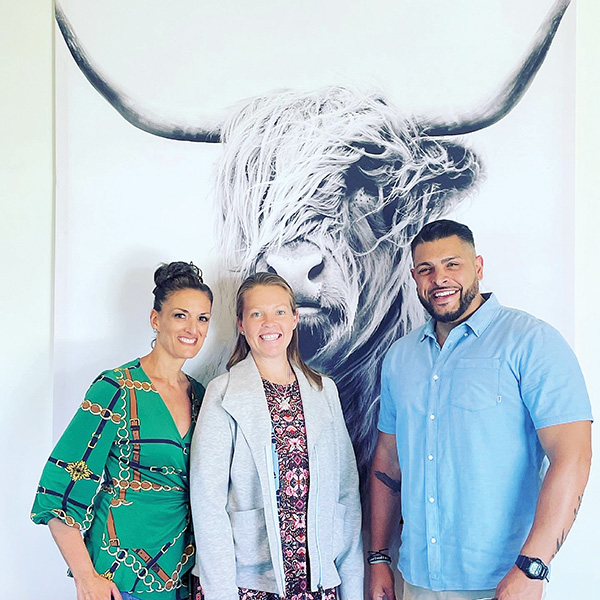
From left, Melissa Rodriguez, director of Marketing and Outreach at GenPsych in Brick and Princeton; Carley Dietrick, Business Development Representative, Seacrest Recovery Center; and Michael La Pietra, director of Business Development at Sprout Health Group, were part of a networking lunch to discuss the collaboration that takes place when someone is struggling with addiction.
By Judy O’Gorman Alvarez
EATONTOWN – We all know how pandemic restrictions have taken a toll on treatment centers, addiction recovery and support groups. Seacrest Recovery Center hosted a Garden to Table Luncheon with representatives from 20 recovery centers to share their thoughts and tales about the past year.
“We wanted to talk about the work we are all doing and the collaboration that takes places when someone is struggling with addiction,” said Carley Dietrick, business development representative at Seacrest. “Since the pandemic we’ve all been on Zoom collaborating virtually and over the phone and email. This was the first time we met in a long time and in some cases it was the first time we put a face with a name.”
Recovery centers and support groups throughout the county and the state were represented.
“We had all sorts of groups, including in-patient, outpatient, sober living, drug and alcohol rehab,” as well as the groups that offer support, such as health and wellness programs. And addiction affects many people in many ways. It’s not just drugs and alcohol, Dietrick points out; it includes eating disorders, gambling and more.
“This brought together the whole community of people interested in the well-being of individuals in Monmouth and Ocean counties,” said Stephanie Reynolds D.O., from the Department of Emergency Medicine at Riverview Medical Center, Red Bank, and shared her perspective as an emergency room physician.
“I thought it was pretty timely to talk about what happens when someone walks into the emergency room – or rolls in – in a state of emergency, whether it be a mental health emergency or a physical emergency,” she said.
“When someone comes into the emergency department and their life is shattered at that very moment and think ‘this is what my life has become. I didn’t grow up thinking I wanted to be addicted to X, Y or Z. I didn’t grow up wanting to have my marriage fall apart, lose my job and be in such a terrible state.’ Whether they’re angry or sad, or suicidal or hungover, it doesn’t matter. The most important moment is the connection you can make when someone is at their lowest,” she said.
Reynolds continued: “So, even in the midst of their anger and despair, we try to maintain a level of compassion and comfort and reassurance to these patients to let them know you’re in a safe place, and you’re a human being to us.”
She pointed out that some people struggling with addiction are afraid to come to the emergency room because of judgmental past experiences. “We’re trying to let people know that emergency departments have changed in their approach to patients in crisis. We try not to judge people on their actions.”
“I even tell my children: your life is not determined by your mistake. Your life is determined by the next thing you do after that mistake.”
Cooperation and collaboration are crucial in recovery. Even though many of the guests offered the same services, and in essence, were competitors, they found sharing thoughts, ideas and wisdom is beneficial. “We may be competitors but we have to work together, to help our clients,” said Dietrick, “the ones who are struggling with addiction.”
If one recovery center determines another center could offer the resources or the chances for a better connection or fit, they will refer them there.
“It’s all about that person and that they stay in recovery for a lengthy amount of time,” she said.
This article originally appeared in the Aug. 12, 2021 print edition of The Two River Times.














